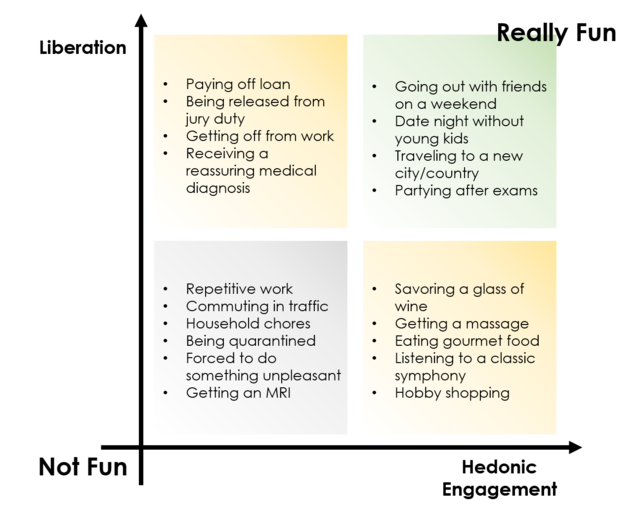Psychology
What Is the Underlying Psychology of Having Fun?
What it takes to bring back the fun in the post-pandemic era.
Posted June 29, 2021 Reviewed by Abigail Fagan
Key points
- The pandemic has limited people's experience of fun by restricting their sense of freedom.
- People experience fun through hedonic engagement and a sense of liberation.
- Fun is an understudied experience that requires more attention from academics and practitioners alike.
Summer of 2021 has officially started with heightened hopes of returning to normalcy—waterparks have re-opened, mini carnivals are sprouting up in neighborhoods, and several cruise lines are now approved to set sail after a 15-month hiatus. For those who are vaccinated, wearing masks is now optional in most places, including cafes and restaurants that are teeming once again with patrons. While the risk of another wave lurks with a new virus variant, many of us are ready to take back what we had missed the most during the pandemic: having fun.
In a recent survey I conducted of 296 U.S. individuals on the impact of COVID on people’s lives, participants reported that they are having significantly less fun than before, and interestingly, this felt reduction of fun was much greater in magnitude than how the pandemic had influenced their feelings of happiness. This suppression of fun during the pandemic era is also reflected in online search data from Google, in which the phrase “things to do for fun” was searched much less frequently during 2020 (shaded in yellow) compared to years prior, whereas the phrase “how to be happy” remained relatively constant in the same period. Although not as high as before, Google searches for “things to do for fun” has picked up considerably in the last few months.

What is it about the nature of fun that makes it so difficult to have during these times? Despite its prevalence in contemporary society, surprisingly little has been studied about fun. Only a handful of scholars have seriously explored this phenomenon, without a clear theoretical definition or explanation of when people experience fun. Could there be a generalizable explanation of why some people experience fun by hitting the dance floor or playing video games while others find reading a novel just as fun?
In search for this answer, for the last five years, I interviewed dozens of individuals from a wide range of socioeconomic backgrounds, collected hundreds of personal narratives written about fun experiences, conducted a photo-ethnography of images solicited through a mobile app, and ran multiple experiments and measurement studies to understand the psychological underpinnings of fun.

My research on fun shows that although a myriad of activities—traveling to a new city, riding a roller coaster, meeting old friends, watching a movie, going to a concert, etc.—can be considered fun, the intensity of the fun experience rests on two psychological pillars of hedonic engagement and a sense of liberation. Having fun, in fact, is an experience of liberating engagement.
A state of hedonic engagement features an active involvement and immersion into an activity that is intended for pure enjoyment. For instance, a 39-year-old female respondent from California described her experience at an escape room as, “…wow it was so much fun! We had to work together to solve puzzles to get out of each room. Nothing was TOO hard, and the stories surrounding each piece were really engaging.” Similarly, many others expressed the essence of fun being how the activity itself is engaging in and of itself, rather than for an external goal (or an over-emphasis on “winning”).
How many times have we told ourselves or our family and friends, after game night that “it’s not about winning but about having fun?” Indeed, my field interviews with a couple of seasoned blackjack dealers at a Vegas casino expressed that the players and dealers rarely have fun (and is even shunned upon) at a high-stakes table while there’s much more fun and joviality at a $5 table.
Another essential characteristic of fun is the sense of liberation—a temporary release from various internalized and externally imposed restrictions, such as work obligations, parenting, schoolwork, and to add to the list, mask wearing and social distancing. Throughout my research journey, the theme of “letting loose,” “being carefree,” and “getting away from it all,” was a recurring topic within really fun experiences. It became quickly evident that if you want to kill someone’s fun, you can do so by enforcing behavioral and psychological limitations, as the pandemic had done to our lives in the past year or so.

As shown in the two-by-two figure above, the yellow boxes represent when we can experience each of the two pillars—liberation and hedonic engagement—independently of one another. For example, we can feel a strong sense of liberation when paying off that student or personal loan but not necessarily experience fun, while drinking that glass of first-growth Bordeaux may be exhilaratingly enjoyable but not necessarily fun. It’s the combination of hedonic engagement and liberation (e.g., going on a summer vacation to Cancun with your friends or family, after a heavy-laden workload during spring) that makes experiences really fun.
So, as we take off our masks and greet our friends and family with a hug this summer and beyond (fingers crossed!), finding fun will heavily depend on whether we can feel carefree and unrestricted again, while engaged in various pleasurable activities.
In my next blog post, I plan to share some of the key aspects of the situation that facilitate the experience of engagement and liberation, which in turn contributes to our experience of fun.
References
Oh, Travis Tae (2020). The Consumer Psychology of Fun (Publication No 27964665). [Doctoral Dissertation Columbia University]. ProQuest Dissertations Publishing.
Oh, Travis Tae and Michel Tuan Pham (forthcoming), "A Liberating-Engagement Theory of Consumer Fun," Journal of Consumer Research.




